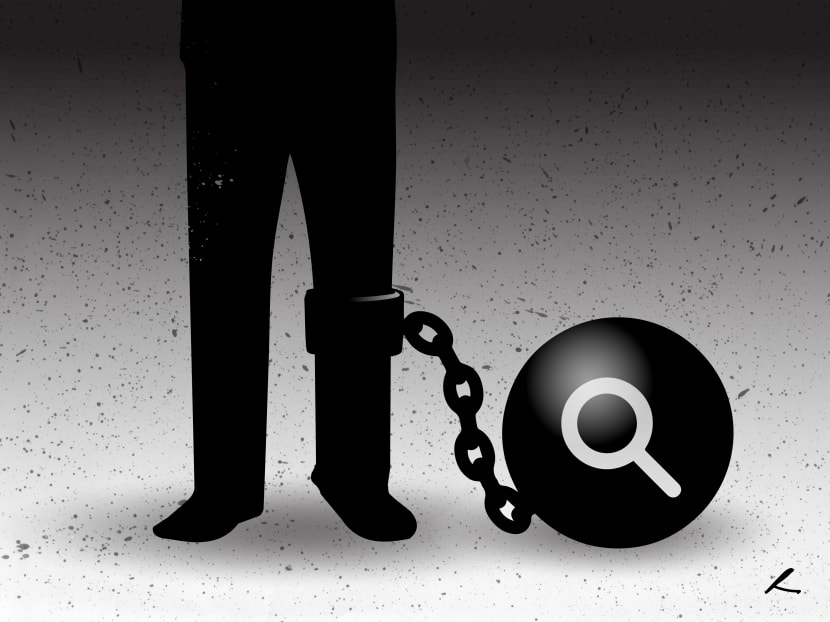The Big Read in short: Ex-offenders struggle to reboot their lives in digital era
Each week, TODAY’s long-running Big Read series delves into the trends and issues that matter. This week, we look at how it has become harder, in the digital age, for individuals to get a fresh start after brushes with the law. This is a shortened version of the feature.
Each week, TODAY’s long-running Big Read series delves into the trends and issues that matter. This week, we look at how it has become harder, in the digital age, for individuals to get a fresh start after brushes with the law. This is a shortened version of the feature, which can be found here.
SINGAPORE — Shame, a loss in reputation, and employment prospects going up in smoke — these are some of the problems that ex-offenders face in today’s digital age, even after they have paid their dues in the eyes of the law.
Mr Chee Chu Siong, 26, was arrested after leaping onto the bonnet of a private-hire car at St James Power Station in May last year. The footage of the incident was posted on Facebook by the driver’s son, and it went viral.
In March, Mr Chee was convicted of committing a rash act that endangered the personal safety of others, and fined the maximum S$2,500. However, up till today, he is still paying a heavy personal price for his alcohol-fuelled folly: He has lost his job as an event management executive, and finds it hard to get steady employment as his name and face are all over the Internet.
Speaking to TODAY, Mr Chee said he feels “sad and disappointed” at what he described as public humiliation online. “Everyone does make mistakes and everyone deserves a second chance… Why make someone’s life so miserable?” he said in a mix of Mandarin and English.
Another former offender, who did not wish to be named, has been similarly affected. After being sentenced to a jail term and slapped with a driving ban for her role in a fatal car accident some time back, online articles and discussion have made it “way harder” for her to deal with the guilt and get over what happened.
She said: “I feel like when people Google my name, the results will mostly be about the accident, (which) is way more damaging to me emotionally and mentally than the punishment itself.”
She tried asking news outlets to take down her photos online or consider archiving articles — effectively removing them online after a while — about cases like hers which do not involve a long period of incarceration. But they did not accede to her requests.
Over the years, TODAY has received — and declined — similar pleas from ex-offenders or their lawyers.
Criminal lawyer Josephus Tan from Invictus Law Corporation said that the media is not prevented by law from reporting a case, unless a gag order or “in-camera” hearing is imposed by the court. In-camera hearings, which was closed to the public and the media, are held when a vulnerable victim gives testimony on the witness stand, for example.
In certain cases, judges may impose a court gag order on the names of accused persons, often to prevent victims of sexual crimes from being identified and embarrassed.
Ms Tania Chin from Withers KhattarWong said she had successfully appealed to journalists not to publish pictures of her clients in the past, which “made a difference”. However, the lawyer added that “there are a lot of things you can’t escape (from), especially things said in open court”.

Ms Tania Chin had successfully appealed to journalists not to publish pictures of her clients in the past, which “made a difference”. Photo: Nuria Ling/TODAY
One high profile case which she had handled in 2012 involved a pimp who ran an online vice ring and recruited escorts, including an underage 17-year-old girl. Nearly 50 men were also dealt with in the case.
She was acting for the pimp, and her client was “very affected by the entire episode”, which stretched on for more than a year till his appeal against his sentence concluded.
Criminal lawyer John Koh of Populus Law Corporation echoed Ms Chin’s concerns, adding that many of his clients have found the online publication of their crimes “more harrowing than traditional media”.
He said that he would tell his clients, especially those who have been convicted, to accept the possibility that being reported on is “very real”. He also asks them to look out for inaccuracies and offers to clarify facts with media outlets if necessary.
The lawyers listed some problems faced by their clients when their crimes are reported and discussed online, including employment issues. This goes especially for relatively young offenders who fear they might not be able to find jobs in the future.
Offenders’ spouses and children could be bullied too, while those charged with white-collar crimes could find their banks dropping them as customers.
EMPLOYERS ‘MORE OPEN’ TO GIVING SECOND CHANCES
While some ex-offenders may now find it harder to leave behind their chequered past, a silver lining is that employers today are more open to the idea of hiring these individuals, even as an increasing number of firms conduct background checks on potential recruits.
Nevertheless, much depends on the sort of crime committed and the nature of the job which the ex-offenders are applying for, said employers and human resource experts who were interviewed.
Ex-offenders should come clean about their past crimes to build a level of trust with their potential employer, said Mr Erman Tan, former president of the Singapore Human Resources Institute.

Criminal lawyer John Koh of Populus Law Corporation said that many of his clients have found the online publication of their crimes “more harrowing than traditional media”. Photo: Unsplash/Niu Niu
He added that while there remain “certain challenges” in hiring ex-offenders, It is up to these individuals to present themselves in the right way and “be realistic” about their chances.
Mr David Ang, director of corporate services at Human Capital Singapore, noted that ex-offenders can fill gaps in certain industries, especially those facing a labour crunch.
Unfortunately, some of them might not be able to use the skills which they have due to their criminal history, he said.
For example, an accountant who serves prison time for financial offences might wind up having to work in security as employers will not trust them to handle money again.
HELPING OFFENDERS GET BACK ON THEIR FEET
Before convicts are released from prison here, they undergo training conducted by the Singapore Corporation of Rehabilitative Enterprises (Score).
The most recent statistics from Score released in February show that 5,307 employers are currently registered with them. Almost all (96 per cent) of inmates referred to Score secured a job before they were released, primarily in the food and beverage, hospitality, logistics and manufacturing industries.
Offenders also have the chance to legally clear their criminal records under the Registration of Criminals Act, if they commit certain minor offences and do not re-offend in five years, among other criteria.
However, for some ex-offenders, this is not enough as they seek redemption — the Internet never forgets.
Said the woman who was involved in the fatal car accident: “Imagine 10 years from now, my record is spent so I can legally say I don’t have a criminal record, but a prospective employer Googles my name and comes to their own conclusion that I’m lying and doesn’t offer me a chance.”









